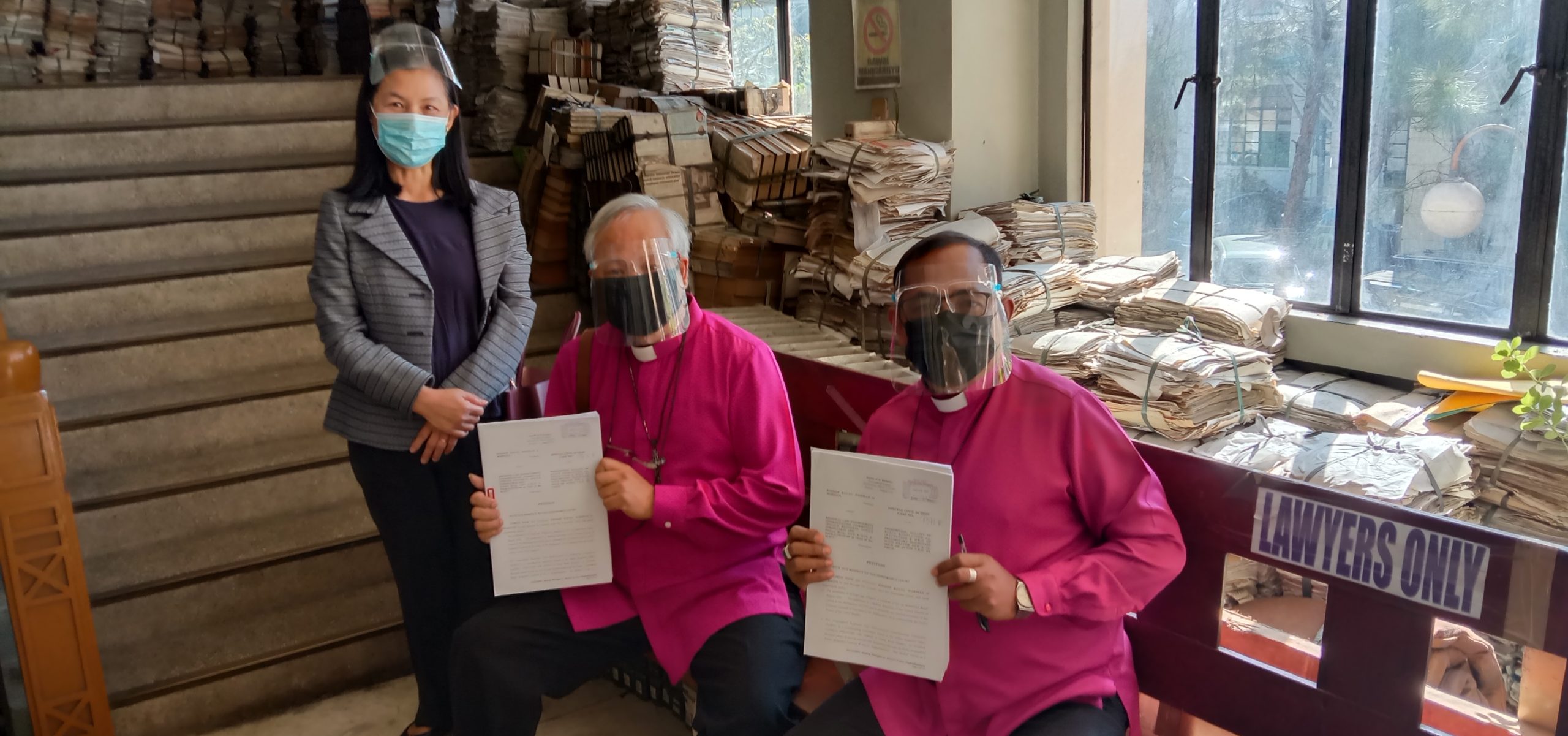
LEGAL RECOURSE United Church of Christ in the Philippines Bishop Emeritus Reuel Norman Marigza (center) shows the petition he filed before the Baguio Regional Trial Court on March 8 seeking an injunction on the resolution of the Cordillera Regional Law Enforcement Coordinating Committee to use the “tokhang” tactic on Left-leaning individuals. The court on Friday junked the petition for being premature. —CONTRIBUTED PHOTO
BAGUIO CITY—A local court here has dismissed the petition of a Protestant leader to stop the proposed “tokhang” strategy against Left-leaning Cordillera residents, including government workers, and journalists.
In his five-page ruling on Wednesday, Judge Michael Francisco of the Baguio Regional Trial Court Branch 6 said he was “constrained” to deny the petition for an injunction and a 20-day restraining order since the tactic has yet to take effect.
The judge cited the assertion made by Police Lt. Col. Solver Gonting, counsel for the Cordillera police, that Resolution No. 4 of the Cordillera Regional Law Enforcement Coordinating Committee (RLECC) to allow the use of the antidrug tokhang tactic on activists was not yet in effect as it needed the concurrence of the Regional Peace and Order Council and the local governments.
During a hearing held on Tuesday, Gonting told the court that the plan could be “modified or altogether rejected by the governors and mayors [in] the Cordillera.”
Constitutional guarantee
On Monday, Bishop Emeritus Reuel Norman Marigza of the United Church of Christ in the Philippines petitioned the court to issue an injunction against Resolution No. 4.
His petition said the tokhang tactic against the Left “violates the constitutional guarantee of an individual’s right to privacy and security at his home.”
In the RLECC resolution that circulated last month, it would task teams to visit the homes of perceived Left-leaning individuals to convince them to abandon their alleged support for the New People’s Army, the Communist Party of the Philippines, the National Democratic Front of the Philippines and their supposed front organizations.
The strategy is patterned after the police’s controversial “Oplan Tokhang”—coined from the Visayan words “toktok” (knock) and “hangyo” (persuade), the centerpiece of the drug war campaign initiated by President Duterte soon after he took office in 2016.
The campaign was renamed “Oplan Double Barrel” in 2018 after local and international outcry over the bloody drug war that had left thousands of drug suspects dead.
Premature
The court said Marigza’s petition was premature, adding that the threat feared by the bishop remained “largely uncertain and contingent upon the adoption of [the RLECC Resolution No. 4].”
The judge also said the police guaranteed that they “will not preemptively enforce ‘Oplan Tokhang’ as contemplated under [Resolution No. 4].”
Earlier, lawyers from the academe and the Integrated Bar of the Philippines (IBP) said the planned tokhang and similar RLECC resolutions violate the Constitution and every law protecting civil rights and due process.
Speaking at a city council inquiry on March 8, IBP Baguio vice president Hilario Belmes said: “Tokhang against the Left violates the judicial rule that everyone must be presumed innocent unless proven guilty of a crime.”
‘Not a crime’
“Ideology is not a crime,” Belmes stressed, echoing the points raised by human rights lawyer Jose Molintas and law professors Lauro Gacayan and Carlo Teodoro of the University of the Cordilleras.
The city council had asked them to examine Resolution No. 4 as well as RLECC Resolution No. 2, which urges local governments to require all organizers of protest rallies or even activities like food drives to secure the consent of the police and the military.
“Will it be that subjective? If I tell you I support Communist China, will that brand me as Left-leaning?” asked Councilor Benny Bomogao, a lawyer.
Requiring the police to knock on the doors of government employees, journalists and other individuals labeled as “enemies” for their political affiliation also breaks a policy of the Philippine National Police that its officers must always be apolitical, said Molintas.
“The police [are] supposed to serve everybody regardless of their ideological beliefs or affiliation whether they are the political Left, the centrists, or the political Right … Left-leaning Filipinos pay taxes and also pay their salaries,” Molintas said.